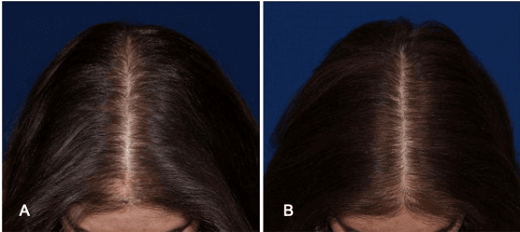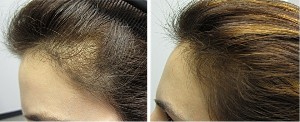A new pilot study on wounding and hair growth just got released online yesterday. The authors found that wounding via Follica’s microneedling device causes new hair growth in women. This is worth reporting because prior research from Follica only entailed studying hair growth in men.

In fact, almost all past research on microneedling and hair growth has focused on male pattern hair loss. Balding men are often satisfied with new hair that grows just 1 inch high. Women, on the other hand, often need superior results in order to make for a natural appearance. I did not think that this would be possible via just wounding and intentional scalp injury.
Men are also more likely to be ok with a shaved or thin appearance on the sides and rear of their heads. And of course many men can get away with just shaving their head entirely.
Scalp Wounding Causes Hair Growth in Women
This latest study was undertaken using Follica’s technology. See the company’s press release from today. The lead researchers were based at Harvard University and at Massachusetts General Hospital. The team was led by Dr. Maryanne Senna.
The study showed that wounding leads to at least some hair growth in all women. See discussion further below. All of the 11 females in the study suffered from mild to moderate female pattern hair loss (FPHL).
The main limitation of the study is obviously the small sample size. All 11 patients underwent six treatments with Follica’s Hair Follicle Neogenesis (HFN) device. Each treatment lasts for just a few minutes. The scalp skin wounding creates an “embryonic window” that allows new hair follicles to form from epithelial stem cells.
Two of the patients were also using Spironolactone for their hair loss during the trial.
Minoxidil Addition
The study summary initially states that on non-treatment days, participants applied a topical “on-market” drug. However, later on in the study, it states the following:
“Subjects applied topical minoxidil 5% foam nightly to these areas for the duration of the trial. Topical minoxidil foam was not applied on treatment days.”
So I guess it is Minoxidil and nothing else in Follica’s topical? A lot of online discussion in the past centered around the addition of valproic acid, but this now seems unlikely.
100 Percent Success
- 10 out of 11 patients reported perceived improvement in hair growth at the end of study.
- All 11 patients demonstrated improvement in physician-graded Sinclair scores after 4 months. The average improvement in Sinclair grade was slightly more than 1 full integer reduction.
The Sinclair Scale for female pattern hair loss was developed by Dr. Rodney Sinclair of Australia. A more commonly used measure in women is the Ludwig Scale. For men, the most common way to classify degree of baldness is the Hamilton-Norwood Scale.
Also see Follica’s announcement of these findings on Twitter.
According to CEO Jason Bhardwaj, their product has the potential to address both male and female androgenetic alopecia. And this study makes clear that the device works well with both longer and shorter hair.
Follica plans to advance its lead program for male pattern hair loss into Phase 3 trials in 2021.
